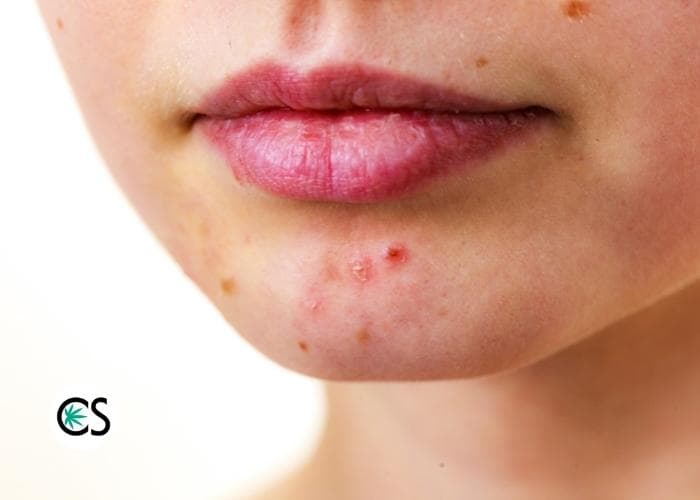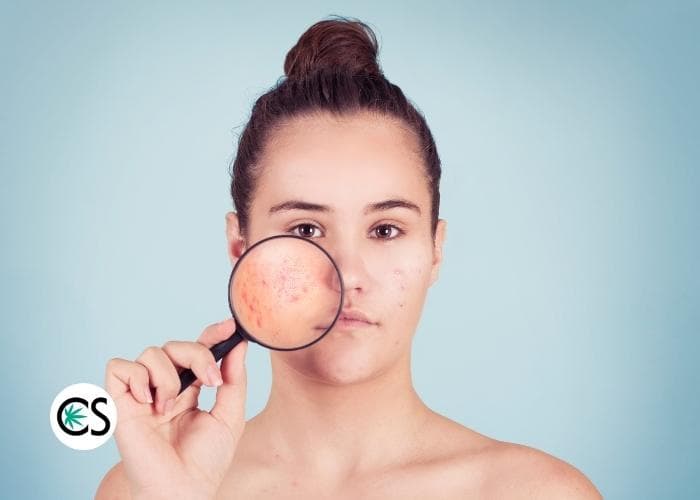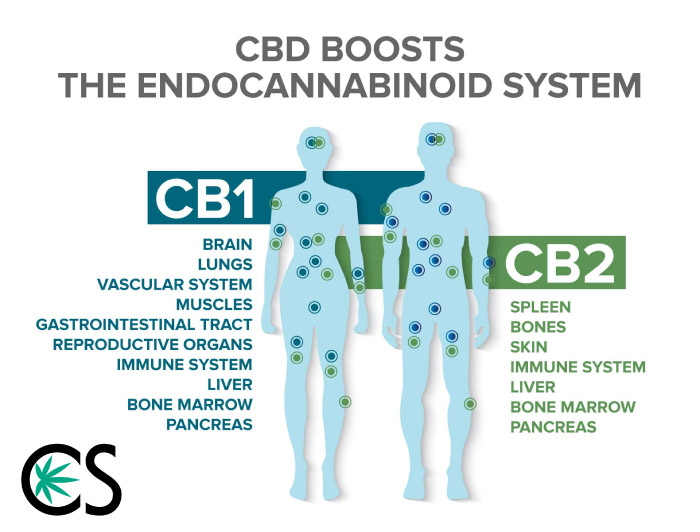
If you are one of the roughly 10%, 9.4% to be exact, of the global population that deals with acne you know that teenagers aren’t the only segment of the population that deals with acne.1
While acne is associated with one of the developmental stages of life and sort of a passage into adulthood, acne can have a mental toll not only on adolescence but also on people as they age. Maybe you are someone that had severe acne which possibly led to you being shy as a kid, which is a trait that stayed with you as you became an adult.
Or maybe you were somewhat lucky and only got acne once in a while in your youth, but when you did, your self-awareness rocketed during this time, and you became an introvert until your acne blemish cleared.
Whichever side you reside on, many of us have dealt with acne at one time or another.
What is CBD?
DISCOVER: What is CBD?
CBD stands for cannabidiol, which is one of over 100 compounds that are found in the cannabis plant. These compounds are called cannabinoids, THC being the most widely popular cannabinoid.
CBD does not give you a “high” feeling the way that THC does. Many people find CBD to actually relax their body and their mind.
While there have been studies on how and why CBD affects the body, additional research is needed to fully understand its efficacy for long-term usage.
Why Do People Get Acne?
According to the Mayo Clinic, “Acne is a skin condition that occurs when your hair follicles become plugged with oil and dead skin cells. It causes whiteheads, blackheads, or pimples.”2
Four of the main reasons why acne happens are:
- Inflammation
- Bacteria
- Excessive oil is produced
- Hair follicles are being clogged by oil and dead skin cells
Although typically acne tends to appear on the face, it can also show on your forehead, chest, back, and shoulders, due to these areas having the most oil glands.
There are a few factors that can prompt or make an acne breakout worse. These include stress, diet, medications, and hormonal changes in the body.

CBD and Inflammation
Research has shown in recent years that inflammation plays a large role in the acne process.
Inflammation occurs when the body senses that an infection is present in a part of the body. White blood cells are sent to the area to stave off the infection, and the end result is inflammation in the area.
So, why would CBD assist someone who has acne?
Well, CBD has been found to have anti-inflammatory effects on the body.
In fact, “CBD has a wide spectrum of biological activity, including antioxidant and anti-inflammatory activity, which is why its activity in the prevention and treatment of diseases whose development is associated with redox imbalance and inflammation has been tested” in many studies.3
Since there is anecdotal evidence, along with a growing amount of studies that are beginning to show the positive effects that CBD has on inflammation, it’s no wonder why CBD may work in assisting one in combating inflammation, and possibly someone’s acne issues.
CBD for Acne, Does it Work?
Inflammation
READ: CBD’s Remarkable Effects on Inflammation
We’ve already discussed above that CBD may help in reducing inflammation issues. This occurs due to a system in the body that was discovered in the mid-1990s called the endocannabinoid system (ECS). CBD also helps the body regulate how much oil, or sebum, the body produces.
The ECS is all over the body, and while this system is not fully understood, the body produces its own cannabinoids (remember CBD is a cannabinoid), called endocannabinoids.
The ECS is believed to maintain balance and homeostasis within the body. Endocannabinoids bind to cannabinoid receptors and help to keep cells alive and healthy.
CBD plays a role because it is believed that CBD helps in keeping the endocannabinoids from deteriorating which assists the body in maintaining homeostasis.

Sebum Production
CBD also helps the body regulate how much oil, or sebum, the body produces. Sebocytes are sebum-producing cells, and it has been shown in studies that CBD “is expected to greatly reduce sebum production in vivo” (Latin for “within the living”).4
Since, as we discussed above, acne can occur when there is an excessive amount of oil produced by the body, the fact that sebum (oil) production is reduced by CBD is a good sign that CBD may assist in reducing acne.
Best Type of CBD Product for Acne
So with all of the information that we know about why CBD for ance issues may be something worthwhile to try, does one type of CBD product work better than others?
All CBD products are not created equal, as the additional ingredients in a product, the way the CBD was extracted, and whether the hemp plant was grown organically, affect the quality of CBD.
Let’s discuss the different types of CBD products and why it matters in attempting to combat acne.
CBD Topicals
DISCOVER: Our Guide to the 10 Best CBD Topicals on the Market
CBD topicals are a great way to provide localized relief with CBD. There are CBD soaps, CBD lotions, and CBD serums on the market that utilize the benefit of CBD infused with other ingredients that may have the ability to provide you with the acne relief you seek.
As mentioned, the ECS is all over your body, including the skin. While not everyone may find relief from using a CBD topical to either clean or moisturize the skin, it may assist you.
CBD Oil
Consuming CBD in a CBD oil tincture is one of the ways to have the CBD remain in your system for the longest period of time. While it does take a longer period of time to show possible results, it is one of the more beneficial ways to take CBD.
Besides consuming CBD via CBD flower or CBD cigarettes, in which smoking is needed, CBD oil usually has the least amount of ingredients vs CBD edibles. While there is a time and place for CBD gummies, consuming ingredients that may not be too healthy to counteract acne doesn’t seem like a beneficial way to go.
Many CBD brands use only CBD and a carrier oil to make their tinctures which allows you to benefit from the CBD without adding additional ingredients into the mix.
CBD Capsules
Another great way to provide your body with a pre-dosed amount of CBD using the fewest ingredients is by consuming CBD capsules or CBD softgels.
If you are familiar with taking daily vitamins or supplements then you should be aware of capsules and softgels, and why they may be a good way to go when it comes to taking CBD.
How to Use CBD for Acne
As mentioned above, find yourself a CBD topical or CBD oil that resonates with you and the issue you are dealing with. Most brands will provide you with recommended instructions for how to use their products.
If you feel CBD oil is the way to go for your acne issue, the common recommended CBD dose is between .15-.25mg per pound of bodyweight.
Side Effects of CBD
READ: Side Effects of CBD
While CBD side effects are mild compared to some medications and supplements, you should be aware that some people do get side effects when they consume CBD.
Some side effects are:
- Dry mouth
- Diarrhea
- Reduced Appetite
- Drowsiness and Fatigue
Prior to operating a motor vehicle, you should understand how CBD affects your body and mood.
Conclusion
Although additional research needs to be performed on CBD to fully understand many aspects, including the long-term efficacy, CBD has shown itself to potentially provide people with some acne relief.
Based on recent research acne may be affected by inflammation more than was previously known, which also potentially parallels the benefits that CBD provides.
While there are some mild side effects, CBD is relatively safe, although you should speak with your doctor prior to consuming it, especially if you take medication due to drug interactions (even CBD topicals may have a drug interaction).
We hope you have a better understanding of how CBD for acne may be beneficial. As always, if you have any questions please email CBD School!
references
1Tan, J. K., & Bhate, K. (2015). A global perspective on the epidemiology of acne. The British journal of dermatology, 172 Suppl 1, 3–12. https://doi.org/10.1111/bjd.13462
2Mayo Foundation for Medical Education and Research. (2022, May 25). Acne. Mayo Clinic. Retrieved August 3, 2022, from https://www.mayoclinic.org/diseases-conditions/acne/symptoms-causes/syc-20368047
3Atalay, S., Jarocka-Karpowicz, I., & Skrzydlewska, E. (2019). Antioxidative and Anti-Inflammatory Properties of Cannabidiol. Antioxidants (Basel, Switzerland), 9(1), 21. https://doi.org/10.3390/antiox9010021
4Oláh, A., Tóth, B. I., Borbíró, I., Sugawara, K., Szöllõsi, A. G., Czifra, G., Pál, B., Ambrus, L., Kloepper, J., Camera, E., Ludovici, M., Picardo, M., Voets, T., Zouboulis, C. C., Paus, R., & Bíró, T. (2014). Cannabidiol exerts sebostatic and antiinflammatory effects on human sebocytes. The Journal of clinical investigation, 124(9), 3713–3724. https://doi.org/10.1172/JCI64628






